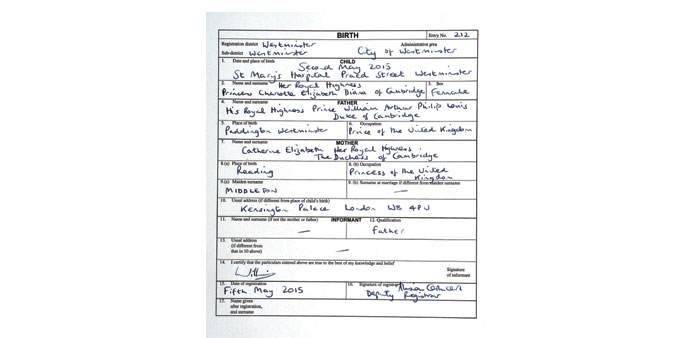The birth certificate of Princess Charlotte of Cambridge, signed by her father, Prince William, Duke of Cambridge at Kensington Palace in London yesterday is seen.
Agencies/London
Queen Elizabeth II met her new great-granddaughter for the first time yesterday, visiting the three-day-old and her parents Prince William and Kate at Kensington Palace.
Princess Charlotte Elizabeth Diana, who was born on Saturday, was named in tribute to the 89-year-old monarch as well as William’s mother Diana, who died in a car crash in 1997.
The Queen was “delighted” at the news of the birth, palace officials said at the time.
Despite their royal status, William, 32, and Kate, 33, were required to officially register the birth of their daughter like any other new parents in Britain.
William signed the paperwork at the palace yesterday, listing as his occupation “Prince of the United Kingdom” and that of his wife as “Princess of the United Kingdom”.
The baby’s full title, Her Royal Highness Princess Charlotte Elizabeth Diana of Cambridge, comes from her parents, who are official known as the Duke and Duchess of Cambridge.
Charlotte is the feminine form of the name of William’s father Prince Charles, the heir to the throne.
The little princess is fourth in line to the throne after her elder brother George, who will be two in July, her father and her grandfather Charles.
Charles and his wife Camilla visited the newborn on Sunday, as did Kate’s parents, Carole and Michael Middleton, and her younger sister Pippa Middleton.
Meanwhile software security experts warned yesterday that computer viruses spiked by more than 50% in Britain on the day Princess Charlotte was born.
As royal well-wishers turned to the internet for news, Engima Software recorded a 54.7% increase in computer malware infections above the typical level.
Criminals are believed to be trying to take advantage of interest in the baby to lure people into clicking on links that will harm their computers.
Enigma analysed tens of thousands of reports of viruses.
Patrick Morganelli, its senior vice-president of technology, described the spike as “pretty unprecedented”.
He said: “Any time there is a jump like that it is usually associated with a people spending more time online, and when the crooks can take advantage of one topic that is top of mind among their potential victims.”
In July 2013, at the time of the birth of Prince George, Enigma reported that in the week following his birth, malware infections in Britain jumped 15.5%.
Scams included fake “CNN Breaking News” e-mails related to the royal baby which contained a malicious link.

